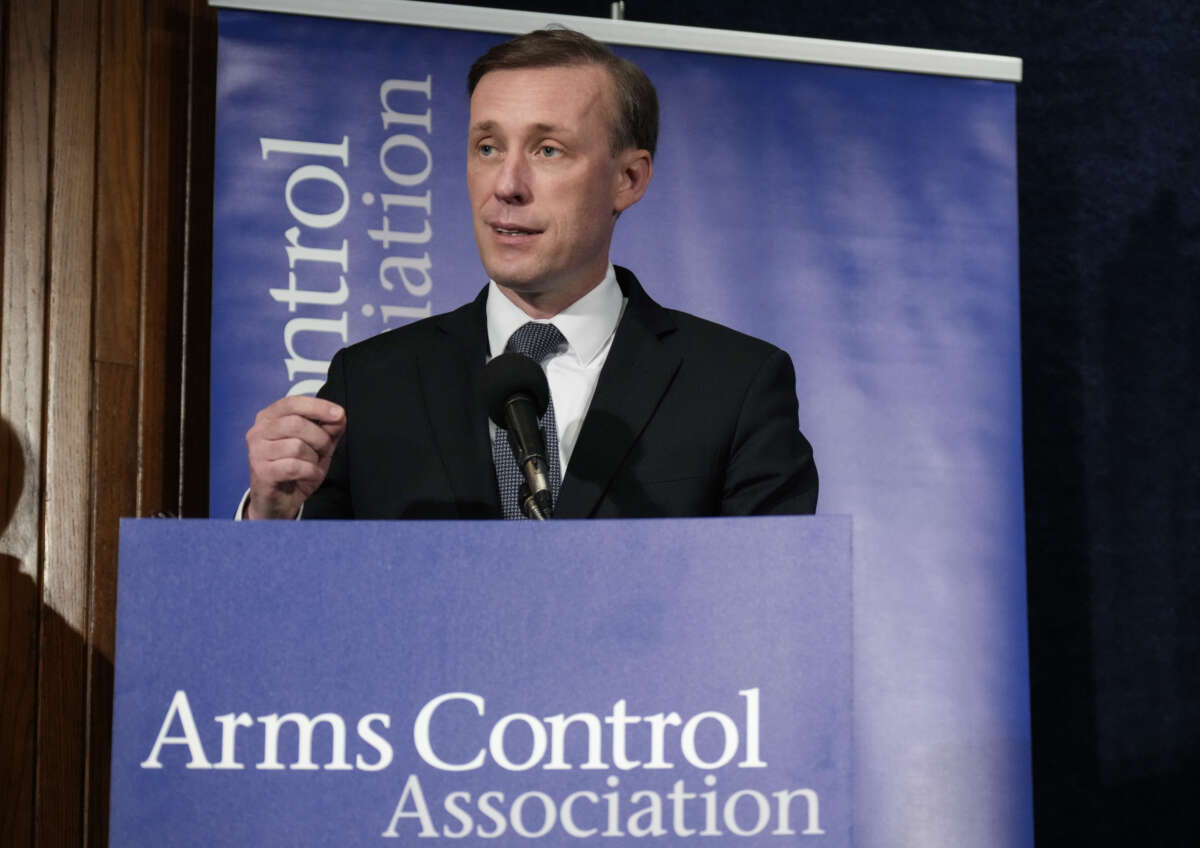The United States is ready to engage in bilateral nuclear talks with Russia and China “without preconditions,” according to National Security Adviser Jake Sullivan.
“Rather than waiting to resolve all of our bilateral differences, the United States is ready to engage Russia now to manage nuclear risks and develop a post-2026 arms control framework,” Sullivan said in a wide-ranging speech at the Arms Control Association’s annual meeting on Friday.
“We’re also ready to engage China without preconditions, helping ensure that competition is managed, and that competition does not veer into conflict,” he added, noting that talks with Moscow will “be impacted by the size and scale of China’s nuclear buildup.”
The comments came just a day after the Biden administration announced that it would pause compliance with certain aspects of the New START Treaty — the sole remaining agreement that caps the U.S. and Russian nuclear arsenals, which is set to expire in 2026 — in reaction to Russian violations of the deal. Among other changes, Washington will no longer share detailed updates on the locations of missiles and launchers with Moscow.
Bill Hartung of the Quincy Institute welcomed Sullivan’s speech as a positive sign at a time when “lowering the temperature on the nuclear issue is imperative.”
“This could not be more important in light of nuclear tensions arising from the war in Ukraine, including threats of nuclear use by Vladimir Putin and other Russian officials,” Hartung told RS.
Bilateral talks with Russia have been limited since the Kremlin invaded Ukraine last year, and Moscow suspended its own compliance with the treaty back in February. But each country continues to observe the deal’s top-level limits of 1,550 deployed strategic nuclear weapons, according to Sullivan, who added that the White House has no intention of changing that.
“Today, we have the number and type of capabilities that we need,” he said, noting that the U.S. was seeking to establish “comprehensive” deterrence with a mix of nuclear and conventional elements.
When asked how he would entice Moscow to come to the table, Sullivan noted that the Soviet Union “engaged in all kinds of military aggression” during the Cold War but was able to compartmentalize nuclear talks from other touchy issues in its relationship with the United States.
“There is a track record of our two countries being capable of engaging in these kinds of discussions in a way that serves our respective national interests and the broader common interest,” he said.
When it comes to China, Sullivan lamented that “the PRC has thus far opted not to come to the table for substantive dialogue.”
“Simply put, we have not yet seen a willingness from the PRC to compartmentalize strategic stability from broader issues in the relationship,” he argued.
But, Sullivan said, the United States is “available for crisis communication, and we’re available for strategic discussions, about everything from space to cyberspace to nuclear stability.” The official did not directly address recent news that China declined a meeting with Defense Secretary Lloyd Austin due to U.S. sanctions on Beijing’s own defense minister.
He did, however, note that he had a “candid discussion” about improving communication with Beijing at a meeting with China’s top foreign policy official in Vienna, Austria, earlier this year.
At a subsequent panel, experts welcomed Sullivan’s commitment to talks without preconditions but worried that the administration’s plans seemed overly focused on short-term issues. The speech “had a lot of question marks for what happens after 2026,” argued Lynn Rusten of the Nuclear Threat Initiative.
Jon Wolfsthal of Global Zero added that any discussion of nuclear talks with China should take into account the fact that Beijing’s arsenal is far smaller than that of Moscow or Washington. “We’re still at a 10-to-one advantage,” Wolfsthal argued.
The U.S. also needs to develop a deeper understanding of why China is pursuing a build-up of its nuclear forces, according to Tong Zhao of Princeton University.
“Both fear and ambition are driving China’s nuclear buildup,” argued Zhao. “China’s current political leadership appears to have convinced itself that the US has a much more aggressive and hostile strategic approach and intention towards China, and they don’t think this can be resolved through reasoning and persuasion.”
“They think that only by building up and demonstrating a much greater strategic capability, that will change the American understanding of the balance of power and make the United States treat China more equally,” he said.
Media that fights fascism
Truthout is funded almost entirely by readers — that’s why we can speak truth to power and cut against the mainstream narrative. But independent journalists at Truthout face mounting political repression under Trump.
We rely on your support to survive McCarthyist censorship. Please make a tax-deductible one-time or monthly donation.
